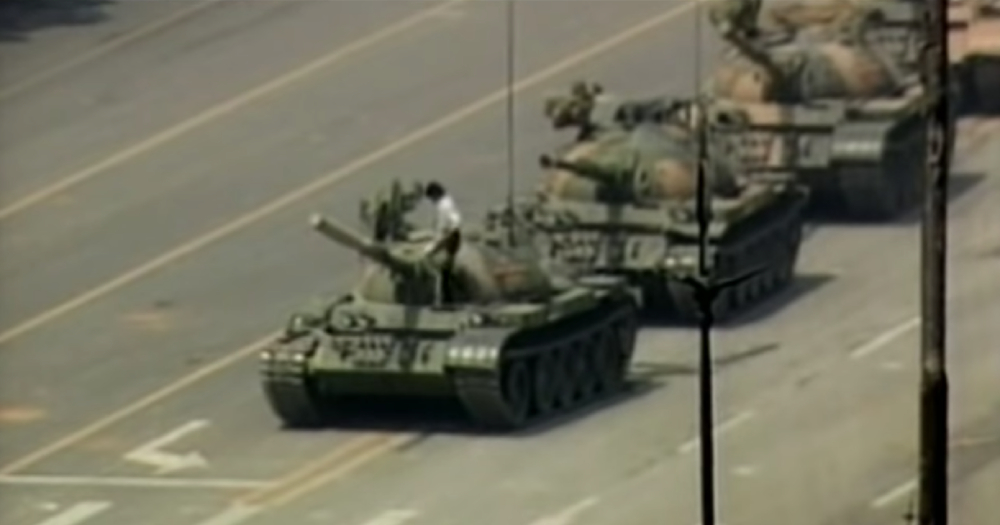While it was wrong to shoot at unarmed civilians during the Tiananmen protests on June 4, 1989, it was necessary, a former People's Liberation Army (PLA) officer said.
"Dirty job" had to be done
In an interview with Hong Kong-based English-language paper South China Morning Post (SCMP), the retired PLA officer who served in the political department said:
"No matter whether it is one or 10,000 people killed, it's still wrong to shoot at unarmed civilians.
But [the troops] had to do this dirty job because the party's rule was in danger."
Exactly 30 years ago, on the night of June 3, Chinese PLA troops moved towards Tiananmen Square and opened fire at tens of thousands of students and workers gathered there.
The crackdown continued till the morning of June 4.
Commanders questioned the decision to use force
The former PLA officer, who refused to be named, revealed that many commanders involved in the crackdown had questioned the decision to crush the protests using force.
He said they had only received a verbal order from the higher-ups and never saw a written instruction from Deng Xiaoping, who was the Chairman of the Central Military Commission (CMC), or the commander-in-chief of the PLA, then.
Furthermore, open disapproval of a military crackdown by Zhao Ziyang, the Party's then general secretary, complicated matters.
Nevertheless, the verbal order was carried out by then CMC vice-chairman Yang Shangkun and Xu Qinxian, the commander of the 38th Army Corps sent to Beijing at that time.
Protestors who refuse to leave are "enemy of the state"
In addition to the instruction that commanders should "clear out Tiananmen Square by June 4", the former PLA officer said they were told that protestors were "an enemy of the state" if they stood their ground.
Panicked and shot into the crowd
To meet the deadline to clear the square, some commanders told their troops to shoot into the air to scare the crowds into retreating, he added.
However, despite firing into the air, many protestors ended up getting shot by ricocheting bullets as they fled, resulting in chaos.
This caused inexperienced soldiers to panic and shoot into the crowds instead, he said.
Death toll disputed
While the number of troops sent in to quash the protests is unknown, a book by United States-based scholar Wu Renhua estimated the figure to be as high as 200,000.
The death toll was disputed to this day as well.
While the only public government document on the matter said more than 200 protestors died during the "riot", one of the most widely cited death toll is 2,600.
Toning down the narrative
The former PLA officer also told SCMP that it was the military who made the push to use the term "political turmoil", instead of the more controversial "counter-revolutionary rebellion" to describe the protests.
The crackdown had allegedly left the military with a psychological burden that they sought to alleviate by toning down the narrative surrounding it.
Admissions of the "incident"
In a rare move by a Chinese Communist Party (CCP) member, China's Defence Minister Wei Fenghe addressed the Tiananmen crackdown on Sunday, June 2, at the Shangri-La Dialogue held in Singapore.
Referring to the crackdown as an "incident", Wei said the CCP "took measures to stop the turbulence which is a correct policy".
And in the 30 years since then, China has enjoyed stability and development, he said.
Defence ministry spokesperson Wu Qian echoed the same while responding to a journalist during his monthly news briefing that took place a few days before Wei's speech, Reuters reported.
He also objected to the use of the word "suppression" to refer to the crackdown.
On Monday, June 3, Chinese state-run media Global Times addressed the "Tiananmen Square incident", saying the approach of "dropping the incident" has helped the country "leave the shadow behind".
In addition, it made references to "external forces" that use the incident to attack China.
https://mothership.sg/2019/06/ccp-china-defend-tiananmen
The belligerent tabloid had previously made a passing mention of the "Tiananmen Incident" during its 25th anniversary.
In an op-ed that defends the country against western accusations of the Chinese government's treatment of political dissidents, it said the "Chinese society has never forgotten the incident 25 years ago but not talking about it indicates the attitude of society".
A day later, it published a response to an official statement made by the United States regarding the "incident".
On this site, in 1989, nothing happened
China has censored any term that has got to do with the events of that day.
And every year on June 4, Chinese characters that resembles a tank, such as 占 and 点, were wiped clean off the Chinese intranet.
Most history textbooks in mainland China make no mention of that fateful day, and even if they do, whitewash the protests as a "riot" instigated by foreign elements.
Top image via
If you like what you read, follow us on Facebook, Instagram, Twitter and Telegram to get the latest updates.
